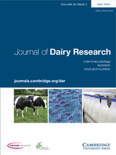
JOURNAL OF DAIRY RESEARCH
Scope & Guideline
Elevating Standards in Dairy Research and Practice
Introduction
Aims and Scopes
- Dairy Animal Health and Welfare:
Research in this area examines factors affecting the health and welfare of dairy animals, including mastitis prevention, nutritional impacts on health, and management practices that enhance animal welfare. - Milk Composition and Quality:
Studies focusing on the biochemical and physical properties of milk, including the effects of diet, genetics, and processing techniques on milk yield, composition, and quality. - Dairy Production Systems:
Research on various dairy farming systems, including conventional and organic practices, with a focus on sustainability and efficiency in milk production. - Dairy Processing and Technology:
Investigations into the technologies and processes used in dairy product manufacturing, including microbial safety, fermentation, and the development of novel dairy products. - Nutritional Sciences in Dairy:
Exploration of dietary influences on dairy cattle, including feed efficiency, supplementation strategies, and the impact of nutrition on milk production and quality. - Genetics and Breeding:
Research on genetic factors influencing dairy traits, including studies on genomic selection, breeding strategies, and the relationship between genetics and milk characteristics.
Trending and Emerging
- Antimicrobial Resistance in Dairy:
Research focusing on antimicrobial resistance among dairy pathogens is increasing, highlighting the importance of addressing this critical public health issue through better management practices and treatment protocols. - Sustainability and Environmental Impact:
There is a growing trend towards studies that explore the sustainability of dairy production, including the environmental impacts of dairy farming and strategies for reducing greenhouse gas emissions. - Use of Advanced Technologies in Dairy Research:
Emerging themes include the application of machine learning, genomics, and precision farming technologies to improve productivity, health monitoring, and overall efficiency in dairy operations. - Functional Foods and Nutraceuticals from Dairy:
Research into the health benefits of dairy products, including the development of functional foods and the role of dairy constituents in health promotion, is gaining popularity. - Animal Welfare and Behavior Studies:
Increased attention is being paid to animal welfare and behavior, with research exploring how management practices influence the well-being of dairy cattle and their productivity.
Declining or Waning
- Traditional Dairy Processing Techniques:
Research focused on conventional dairy processing methods has seen a decrease, likely due to the increasing emphasis on innovative and sustainable processing technologies that improve product quality and safety. - Basic Feed Nutrient Studies:
While still relevant, studies solely focusing on the basic nutritional components of dairy feed are becoming less common, as there is a growing interest in more complex interactions between nutrition, health, and production outcomes. - Regional Studies on Dairy Practices:
The journal has published fewer papers concentrating on specific regional dairy practices, as there is a trend towards broader, more global studies that encompass comparative analyses across different dairy systems.
Similar Journals

ANIMAL SCIENCE PAPERS AND REPORTS
Pioneering Insights in Animal Science and Veterinary AdvancementsANIMAL SCIENCE PAPERS AND REPORTS, published by the Polish Academy of Sciences, Institute of Genetics and Animal Biotechnology, is a distinguished platform for interdisciplinary research reflecting the evolving fields of Animal Science, Biotechnology, and Genetics. With an ISSN of 0860-4037 and an E-ISSN of 2300-8342, this journal serves as an essential resource for researchers and professionals aiming to advance their understanding and apply innovative methodologies in veterinary science and animal biotechnology. Despite being classified in Quartile 4 across several categories in 2023 and noting a notable country-based focus in Poland, it continues to provide valuable insights into animal genetics and biotechnological advancements, particularly as it converges its content from 2007 to 2024. While currently not an open access journal, ANIMAL SCIENCE PAPERS AND REPORTS is committed to upholding academic rigor, making it a key asset for students, researchers, and industry professionals looking to contribute to and stay informed in these vital scientific areas.

Poultry Science Journal
Championing innovative advancements in poultry production.Poultry Science Journal, with the ISSN 2345-6604 and E-ISSN 2345-6566, is an esteemed publication spearheaded by Gorgan University of Agricultural Sciences & Natural Resources since its transition to Open Access in 2013. Based in Iran, this journal serves as a vital platform for disseminating cutting-edge research and innovative advancements in the fields of Animal Science and Food Animals. With a current impact reflected in its Q3 quartile ranking within its categories and Scopus ranks indicating a competitive standing among peers, the journal plays a crucial role in enhancing the academic discourse surrounding poultry science. Researchers, professionals, and students alike are encouraged to engage with the journal’s high-quality content, which encompasses diverse topics including poultry genetics, nutrition, health, and welfare, thereby contributing to the improvement of poultry production practices globally. The journal’s commitment to accessibility ensures that valuable findings are readily available to the scientific community, fostering collaboration and advancing research in this essential domain of agricultural science.

Tropical Animal Science Journal
Exploring Innovations in Veterinary Medicine and Animal ScienceTropical Animal Science Journal, ISSN 2615-787X, E-ISSN 2615-790X, is an esteemed open-access journal published by the Bogor Agricultural University, Faculty of Animal Science. Launched in 2018, this journal serves as a pivotal platform for disseminating high-quality research in the fields of Animal Science, Food Animals, and Veterinary Medicine. With its significant presence in Indonesia and a commitment to scientific innovation, it has achieved a Q3 ranking in Animal Science and Zoology and Food Animals, as well as a Q2 ranking in Veterinary (miscellaneous) as of 2023. The journal also enjoys favorable Scopus rankings, placing it in the 61st percentile for General Veterinary and demonstrating its relevance and impact in the academic community. As an advocate for open-access publishing since its inception, the journal enhances accessibility to critical research findings, making it an invaluable resource for researchers, professionals, and students alike who aim to advance their knowledge and contribute to the fields of tropical animal science.
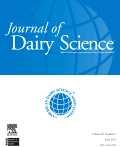
JOURNAL OF DAIRY SCIENCE
Advancing Dairy Science Through Research ExcellenceThe JOURNAL OF DAIRY SCIENCE, published by Elsevier Science Inc., stands as a premier outlet for scholarly research in the fields of Animal Science, Food Science, and Genetics. With an impressive legacy dating back to 1917, this esteemed journal continues to contribute significantly to the advancement of dairy science and related disciplines, boasting a remarkable Q1 status across its categories as of 2023. In the realm of Agricultural and Biological Sciences, it ranks 15th out of 490 in Animal Science and Zoology, indicating a strong influence and recognition in the field. Researchers and professionals worldwide rely on this journal for the latest findings, innovative techniques, and comprehensive reviews, making it an essential resource for advancing knowledge and practices within the dairy sector. While the journal maintains a subscription-based access model, its rich content remains unparalleled in guiding future research and fostering collaborative advancements. Its enduring commitment to quality sets a high standard for publication, reinforcing its invaluable position in the scientific community.
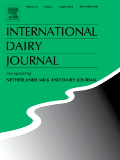
INTERNATIONAL DAIRY JOURNAL
Championing excellence in dairy science and technology.INTERNATIONAL DAIRY JOURNAL, published by Elsevier Science Ltd, is an esteemed peer-reviewed journal dedicated to advancing knowledge in the diverse and vital fields of Applied Microbiology and Biotechnology and Food Science. With an ISSN of 0958-6946 and E-ISSN of 1879-0143, this journal plays a crucial role in disseminating research findings from 1991 to 2024 and is consistently recognized for its impact, evidenced by its placement in the Q2 quartile for Applied Microbiology and Biotechnology and Q1 for Food Science in 2023. Rated at the 79th percentile in Food Science and the 68th percentile in Applied Microbiology, it serves as a vital resource for researchers, professionals, and students worldwide. Although the journal does not currently offer open access, its rigorous publication standards ensure that each article significantly contributes to the understanding of dairy science and technology, fostering innovation and application in the dairy industry.

Translational Animal Science
Enhancing Animal Welfare Through Translational ResearchTranslational Animal Science, published by Oxford University Press Inc, stands as a prominent journal in the fields of Animal Science and Zoology as well as Veterinary Sciences, achieving a commendable Q2 ranking in both categories for 2023. With an E-ISSN of 2573-2102 and transitioning to an Open Access model since 2017, this journal fosters accessibility and dissemination of vital research that bridges the gap between basic animal science and its practical applications. The journal's significant impact factor, where it ranks in the 71st and 65th percentiles respectively for Veterinary and Agricultural and Biological Sciences disciplines, highlights its importance as a resource for emerging trends and innovations in animal research. With submissions accepted until 2024, Translational Animal Science not only contributes to advancing knowledge but also aims to engage a broad audience of researchers, professionals, and students dedicated to improving animal health and welfare. Based in India, the journal serves as an essential platform for the exchange of scientific ideas that facilitate progress within these vital fields.
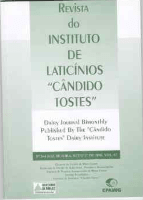
Journal of Candido Tostes Dairy Institute
Pioneering Insights for Global Dairy StandardsJournal of Candido Tostes Dairy Institute, published by the prestigious INST LATICINIOS CANDIDO TOSTES, has established itself as a vital resource in the field of dairy science and technology. This Open Access journal, operating since 2008, provides an inclusive platform for researchers, professionals, and students to share groundbreaking findings and innovative practices related to dairy production, processing, and quality. Located in Brazil, this journal aims to advance knowledge and standards within the dairy industry, ensuring global access to high-quality, peer-reviewed research. The journal not only contributes to the scientific community but also supports practical advancements that benefit dairy producers and consumers globally. By fostering collaboration among scholars and practitioners, the Journal of Candido Tostes Dairy Institute plays a crucial role in shaping the future of dairy sciences. We encourage contributions that explore novel aspects of dairy research, thereby bridging theoretical insights with industry applications.
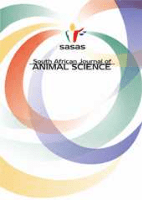
SOUTH AFRICAN JOURNAL OF ANIMAL SCIENCE
Elevating standards in animal husbandry and breeding practices.SOUTH AFRICAN JOURNAL OF ANIMAL SCIENCE is a leading scholarly publication dedicated to the dissemination of original research, review articles, and critical insights in the fields of animal science and zoology. Established in 1974, this journal is published by the South African Journal of Animal Sciences and has since become an essential resource for researchers and professionals in the field. The journal, which currently holds a Q3 ranking in Animal Science and Zoology as per Scopus rankings, aims to promote scientific knowledge and innovation in animal husbandry, welfare, nutrition, and breeding practices, with a particular emphasis on the South African context. The journal's rigorous peer-review process ensures high-quality research is shared widely among the academic community. Researchers and students alike will find valuable content and access options that support ongoing education and professional development in this vital area of study. For more information, interested readers can contact the editorial office at PO Box 13884, Hatfield 0028, South Africa.

Buffalo Bulletin
Empowering research, enhancing buffalo health.Welcome to the Buffalo Bulletin, a prominent journal published by the International Buffalo Information Center that serves as a vital resource in the fields of animal science and veterinary studies. Established in 2008, this journal has become a significant platform for sharing groundbreaking research and developments specific to buffalo ecology, breeding, and health management, contributing to improved husbandry practices in Thailand and beyond. Despite its current Q4 ranking in Animal Science and Q3 in Veterinary (Miscellaneous) categories based on 2023 metrics, the Buffalo Bulletin is dedicated to elevating knowledge and innovation, thereby enriching the scientific community's understanding. With its commitment to open access, readers can conveniently access a compendium of peer-reviewed research designed to inform and inspire practitioners, researchers, and students alike. Through its convergence of interdisciplinary insights, the Buffalo Bulletin plays a crucial role in advancing the field and fostering a collaborative approach to the challenges faced in animal healthcare and management.

Animal Bioscience
Innovating the Future of Animal BiosciencesAnimal Bioscience is a premier journal dedicated to advancing the field of animal science, published by the esteemed ASIAN-AUSTRALASIAN ASSOCIATION OF ANIMAL PRODUCTION SOCIETY. With an impactful presence in South Korea, this journal serves as a pivotal platform for disseminating high-quality research in animal production, nutrition, genetics, and veterinary sciences. Its notable standing is reflected in its categorization within the Q1 quartile for Animal Science and Zoology and Veterinary (miscellaneous) disciplines, highlighting the journal's dedication to excellence and relevance. Additionally, Animal Bioscience has secured impressive rankings in various related fields, with a 94th percentile position in general veterinary studies. As an Open Access publication, it encourages broad distribution and engagement with its content, making significant contributions to the global discourse surrounding animal technology and welfare. This journal is an invaluable resource for researchers, professionals, and students aiming to deepen their understanding and promote innovations in animal biosciences.